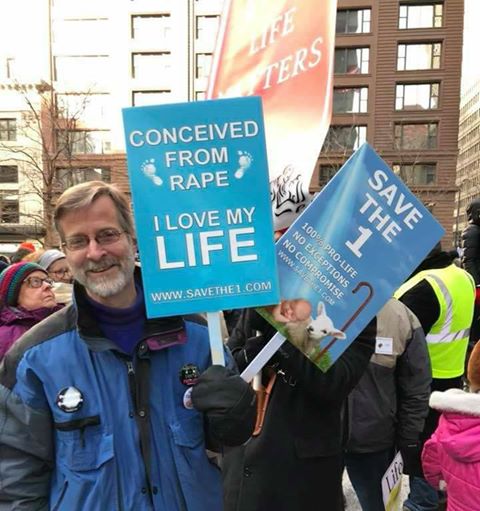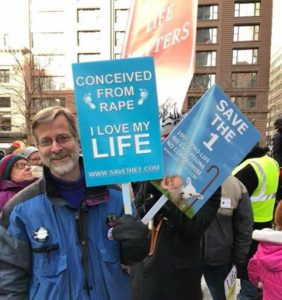
1%. It doesn’t sound like very much. If the sales tax goes up 1% in your town, you may notice the slight increase and may shop somewhere else. If your weight goes up 1% after Thanksgiving, it’s most likely only temporary. If you buy a car with 1% better gas mileage, you may not notice anything different. But, what is the impact on human life because of abortion exceptions, which amount to about 1% of cases?

Why is the 20 week abortion ban seen as a tremendous opportunity for a pro-life victory, while eliminating the rape exception is nearly at the bottom of the priority list for ending abortion? Isn’t it shocking that the prospect of annually saving 18,000 babies’ lives with the 20 week ban, a laudable goal, is enthusiastically pursued, while the chance to permanently protect the 32,000 or more babies conceived from rape every year, by eliminating all traces of the rape exception, is not supported by many in leadership positions, (both pro-life and clergy), and in political office?
The rape exception is a creation of the abortion rights movement, but is accepted and promoted by some in the pro-life community out of a false sense of compassion, because it is the popular view, or because of pro-life politics. Most of these people do not consider my life at all. To them, the rape exception is only a concept.
I was conceived when my mother was attacked on her way home from work in the late summer of 1957. It is interesting to note that at the same time in 1957, members of a prominent lawyers group, The American Law Institute, (ALI), proposed and recommended that the first exceptions policy guidelines be added to state abortion prohibition laws. The ALI exceptions were: grave physical or mental health impact to the mother, evidence that the child would be born with a grave physical or mental defect, and rape and incest.
Mississippi added a rape exception in 1966. Colorado was the first state to incorporate the ALI exceptions in 1967. Thirteen states were using the ALI exceptions template by the time Roe v. Wade was decided in 1973.
I discovered my conception story in 2005, and the news was initially devastating. I have thought about my conception every day since, but, the initial pain has been replaced by a powerful pro-life energy and purpose. What is still devastating is the constant push for “exceptions” in law. It is quite a significant betrayal when the exception efforts come from the pro-life side. Their efforts, projecting them back to 1957, would have resulted in not protecting my life. Today, the exceptions target tens of thousands of babies when they are added to pro-life legislation. Our collective efforts at Save The 1 work to end the exceptions era and explain why exceptions are bad pro-life policy.
Unfortunately, those who advocate for exceptions never tell anyone when the rape exception era will end. They never tell us what has to happen in order to permanently eliminate the exceptions. They don’t seem to believe that the exceptions strategy is a broken strategy. They don’t make the connection between the rape exception and the history of the Roe v. Wade decision. They deemphasize the rape exception by saying that it only amounts to 1% of cases. This may be the most common rationale behind the promotion of the rape exception.
What is behind the facade of that 1% deflection? How can you say to a targeted group of people, “Sorry, there just aren’t enough of you to work very hard to protect?” There is a number that beyond which no one in the pro-life community could ignore. They never tell us what that number is, if they’ve even considered what it should be. It is clear that 1% is not enough. And, it is the ultimate cruelty. It is cruel to the rape-conceived. It is saying: “Your numbers are not significant enough to make it worthwhile to fight for your protection.” It is also cruel to women. Cruel and shocking. I don’t think anyone that supports exceptions has even considered it.
Being 1% is not yet enough to achieve legal protection for the rape-conceived. In order for that number to be higher and “significant” enough to be noticed, even MORE women would have to be raped and pregnant. Can you think of anything crueler than that? Is that really what it is going to take to end the “exceptions” era? Must we add countless more traumatized women to the 1% in order to surpass the mystery magic number necessary to purge exceptions from orthodox pro-life strategy? The obvious answer is NO! 1% is way more than enough.
Our founder and President, Rebecca Kiessling, discusses how exceptions impacted the Roe v. Wade decision in this article.
https://www.facebook.com/notes/rebecca-kiessling/the-trouble-with-unprincipled-incrementalism-and-allowing-for-exceptions/10150193880073154/
And this previous Save The 1 article expands on the point about the broken strategy.
https://www.lifesitenews.com/opinion/rape-exceptions-in-congress-a-broken-record
Please visit our SaveThe1.com website to learn the best responses to the defenses of the rape exception and answers to the questions you may hear. Please add the arguments presented in this short essay to bolster the information you will find on our website.
BIO
Jim Sable is a husband and father of 4 — 3 biological sons and one recently-adopted daughter from China. He and his wife Wendy are both adopted. Conceived in rape, Jim is also a Board Member, national pro-life speaker and pro-life blogger for Save The 1.


